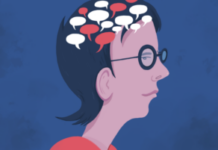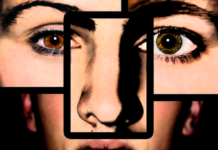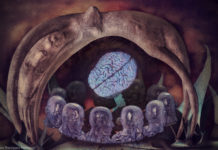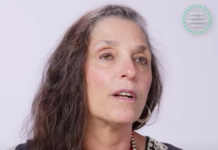Anyone Can Be Trained to Hallucinate
From Flipboard: In a recent study on auditory hallucinations, all participants — not just those who had been diagnosed with psychosis — experienced conditioned hallucinations. The study...
Do Voice Hearers Have the Right to Refuse Psychiatric Drugs?
In this piece for STAT, Shirley S. Wang discusses the Hearing Voices Network and its non-pathologizing, rights-affirming approach to hearing voices and alternative realities.
"Many recovered...
Saved by the Book: Can Reading be More Effective than Medication or Therapy?
“Studies show that self-help books can resolve readers’ depressed moods, change ingrained thought patterns, and instill a renewed zest for life – as long as the advice within is scientifically sound,” Elizabeth Svoboda writes for Aeon. “The literature we choose to guide us should supply proven advice we can trust. But it should also, as Franz Kafka wrote, be ‘the axe for the frozen sea within us’, bludgeoning us in ways that awaken us to the extraordinary.”
Schizophrenia’s Tangled Roots
From Sapiens: Researchers are increasingly recognizing the role that social and environmental factors, including childhood abuse, stressful events, and poverty, play in the development of...
Mindfulness Intervention Can Prevent Depression, Study Finds
A combined mindfulness and behavioral activation intervention is shown to reduce depressive symptoms and serve as a preventative factor for major depressive disorder.
Victims of Success: An Update from Mad in America Continuing Education
Within days of announcing the webinar and providing the link to register, we were deluged with enrollments. It turns out that a great many professionals, advocates and clinical managers are interested in learning about Open Dialogue and its application to an American community.
First-ever Peer-supported Open Dialogue Conference
-On March 11, 2015, the NHS Foundation and three other Trusts are hosting a free conference to "take stock" after one year of Peer-supported Open Dialogue.
Psychologists Argue for Decolonial Approach to Global Poverty
Individualist psychological models of poverty pathologize poor communities, decolonial approaches that emphasize context and interdependence may be more sustainable.
“Open Dialogue: Finland’s Alternative Approach to Mental Illness”
"Almost 30 years ago a group of clinicians in Finland decided to treat psychosis differently. Their approach, known as Open Dialogue, has impressive recovery...
The Revolution in Psychotherapy
Since the time of Freud, the field of psychotherapy has assumed that modalities and techniques were the instruments of change in psychotherapy. But the evidence is mounting that modalities and techniques have relatively little to do with effectiveness; evidence shows that it is the human elements of psychotherapy that are the most potent agents of healing
“Helping Others Dampens the Effects of Everyday Stress”
"The holiday season can be a very stressful time, so think about giving directions, asking someone if they need help, or holding that elevator...
“Psychiatry’s Mind-Brain Problem”
A New York Times Op-Ed by Cornell psychiatry professor George Makari connects the surprise over the results of the widely-covered RAISE study to American psychiatry’s shift toward pharmacology and the oversimplification of disorders as brain diseases.
Finding Clarity Through Clutter
For the last three years, I have been working with people, labeled "hoarders," who have become overwhelmed by their possessions in their homes. This has been some of the most interesting, challenging and thought-provoking work I have ever done. It is also an area that, I think, highlights all of the issues that challenge us in helping people who feel overwhelmed, for whatever reason.
Researchers Explore Sexuality and Gender in the Context of Psychosis
Nev Jones and a team of researchers examine how sex, sexuality, and gender-related content are underexplored in contemporary research on psychosis.
Tom Arnkil on “Unconditional Respect for the ‘Otherness’ of Other People”
Tom Arnkil on the book he co-authored with Jaakko Seikkula, and the necessity for the "Unconditional Respect for the 'Otherness' of Other People."
“How Meditation Changes the Brain and Body”
In the New York Times Well Blog, Gretchen Reynolds covers a study published in Biological Psychiatry showing that mindfulness meditation, unlike a placebo, “can change...
Letters to the Editor: “The Treatment of Choice”
Readers respond to the New York Times article, “The Treatment of Choice,” about innovative programs for psychosis and schizophrenia that involve patients and their families in treatment decisions. “Narratives of success counter a drumbeat of faulty links of mental illness and violence, inaccuracies which serve only to further stigmatize and isolate individuals with psychiatric illness.”
“What Are Delusions – And How Best Can We Treat Them?”
For The Conversation, psychologist John Done, from the University of Hertfordshire, explains his approach to discussing delusions with his patients. Done recommends more qualitative...
The Fictions and Futures of Transformative Justice
In this interview for The New Inquiry, two co-editors and three writers of Octavia's Brood: Science Fiction Stories From Social Justice Movements discuss prison abolition and...
“Does Psychoanalysis Have a Role in Modern Mental Health Care?”
Lynne Malcolm, for ABC’s All In the Mind program, interviews three psychoanalysts about how their field remains “relevant and useful in the contemporary therapeutic...
Storytelling Therapy for Trauma and Bullying
A study out of the University of Buffalo explores the use of Narrative Exposure Therapy to treat youth PTSD and substance abuse. “Trauma is...
Call For Abstracts: Philosophical Perspectives on Critical Psychiatry
The Association for Advancement in Philosophy and Psychiatry is issuing a call for abstracts, with a particular interest in submissions from service users. The...
“The Surprising Reason Psychotherapy Works”
For Psychology Today, David Elkins writes that “psychotherapy's power to heal lies mainly in its human and relational aspects,” rather than any specific techniques...
Mental Health Industry Should Embrace Choices Beyond Drugs
In this video for NowThis, Yana Jacobs critiques the mental health industry standard of prescribing drugs as the first-line treatment for "mental illness." She emphasizes...
“Does Psychotherapy Research with Trauma Survivors Underestimate the Patient-Therapist Relationship?”
Joan Cook, professor of Psychology at Yale, writes than in her work with military veterans she realized that her psychotherapy techniques mattered much less than her training had indicated. Instead, what mattered was “the bond forged over years of therapy,” known as “the therapeutic alliance.”


















